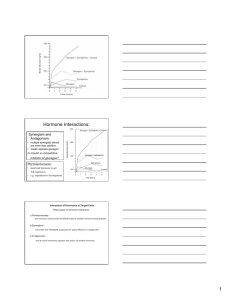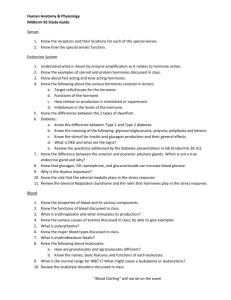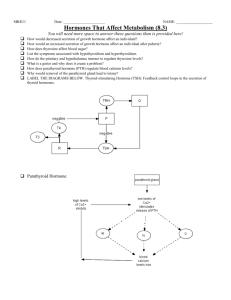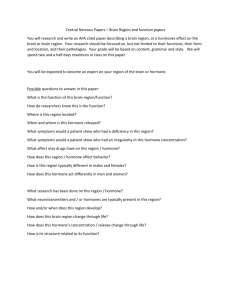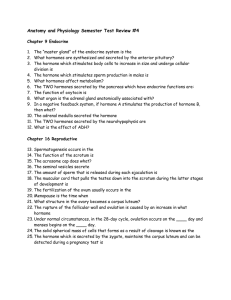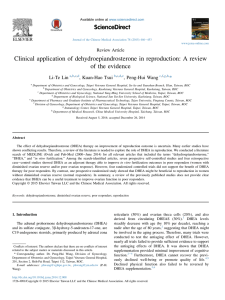Post-Menopausal Health and HRT
advertisement
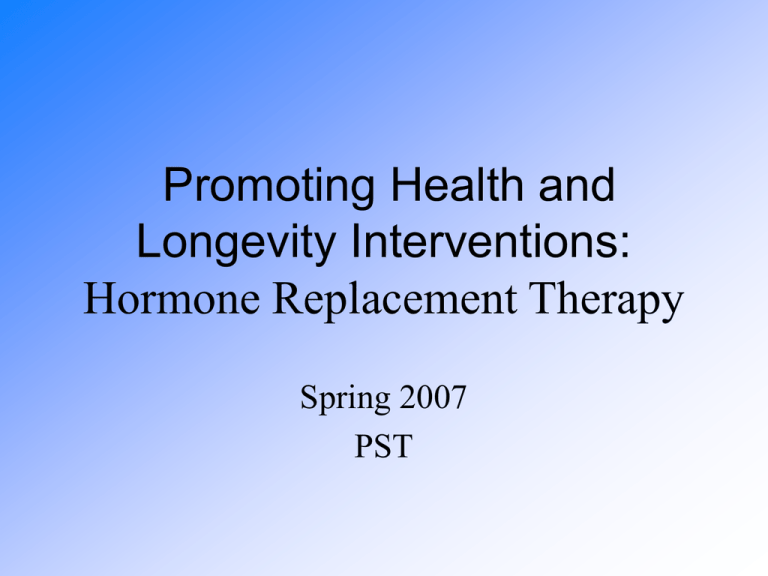
Promoting Health and Longevity Interventions: Hormone Replacement Therapy Spring 2007 PST Hormone Replacement Therapy 1. Loss of a body constituent • Metabolite, hormone, enzyme, vitamin, etc. 2. Constituent is necessary for the organisms survival and normal function 3. Involves the attempt to replace, or substitute, the lost constituent with a similar exogenous substance with comparable properties and actions • Dose, duration, metabolism, target cells, and side effects Historical Aspects • Organotherapy – • Charles Edouard Brown-Sequard • Suggested that “internal secretions” were produced by organs such as the testis, and that disease and aging resulted from their deficiency Hormones – Greek “I arouse to activity / I excite” • Term introduced by E. H. Starling in 1905 following the discovery of Secretin with W. M. Bayliss Dr. Brown Sequard (Physiologist, Univ. Sorbonne, Paris) introduced the idea that some glands secrete internally (in the blood) potent substances that affect the whole organism. In 1905, these substances were called “hormones” by the British physiologist E.H. Starling. Replacement Therapy Problems in Aging • Complexity of endocrine system • Loss or insufficiency of endogenous hormones • Target cells for hormones are themselves aging and this may effect their responsiveness • Changes in hormones and their targets due to disease and degenerative processes Hormone Replacement Strategies • • • • Adrenal Sex Steroids and DHEA Growth Hormone Insulin (as in Lecture on 4/13) Reproductive Hormones Dihydroepiandrosterone (DHEA) • DHEA is the principal adrenal androgen *Note-Does not bind androgen receptor • DHEA(S) concentrations change throughout the human life • DHEA(S) levels are lower in women than men • Increased mortality is associated in men with a lower DHEA(S) baseline, but not in women DHEA and Aging Epidemiological Evidence (DHEA low levels) • cardiovascular mortality • Found in: – Autoimmune diseases – Dementia – Breast cancer • DHEA(S) levels may be indicative of a severe disease or predictive of a future disease DHEA Replacement beneficial in: • Adrenal Insufficiency • Healthy Elderly? – No increase in well being, cognition, nor sexuality • Elderly with impaired mood, cognition and sexual function? DHEA • Want to live to 100 or longer? • Want to glow with energy every day, well into your 80s and 90s? • Want to overcome depression and disease, and live a happier and healthier life, starting now? • Want to lose flab, erase (or prevent) wrinkles, firm your skin and harden your muscles? • Want to look and feel sexy--so much so that other people begin to notice? • A substance called DHEA could be the key to achieving one or all of these antiaging benefits--perhaps even life extension itself. Growth Hormone and Aging • Study in 1990 demonstrated in small group of elderly men that GH and IGF I levels were reduced: – 12 out of 21 men injected with hGH over a 6 month period showed small increases in muscle mass and bone density (10-14%) – Suggests that GH might be responsible in part for decreased muscle and bone in elderly Female GH dwarf GH gigantism: 12-year old boy Acromegaly Role of GH in Aging • GH and IGF-I serum levels decrease in some elderly and nocturnal peak is lower or absent – Possibly due to: • Decreased GHRH • Increased GHIH (somatostatin) • Stress Advertisement • “As seen on NBC, CBS, and CNN! The health discovery that actually reverses aging while burning fat, without dieting or exercise! This proven discovery has even been reported on by the New England Journal of Medicine. Forget aging and dieting forever! And It’s Guaranteed!” Effects of GH Treatment • 1998 study of ICU patients found: – Mortality increased from 19% to 44% in patients having GH therapy for 7-14 days – Length of hospital stay was prolonged by GH therapy • Attributed to: – Decreased immune function – Increased insulin resistance – Multi-Organ Failure HGH Enhancers (Human Growth Hormone) • Non-injectable HGH • Herbal equivalents designed to release the body’s own GH – May elevate GH equivalent to that achieved by eating a steak • Oral HGH is broken down by the digestive process • “At best a waste of money, at worst an unknown health risk” Types of Hormones Used in PostMenopause • Estrogens – Alone or with progestin – Types and route of administration – Optimal dose is the lowest dose to treat symptoms over the shortest duration • Progestins – With Estrogen to reduce risk of endometrial cancer – Cardiovascular risks outweigh benefits – Other products for osteoporosis treatment Risks of HT • Estrogen + Progestin – Increases Risk of: • • • • • Breast Cancer Heart Disease Stroke Blood Clots Dementia – Decreased Risk of: • Hip Fractures (Osteoporosis) • Colon Cancer Benefits of HRT • Relieves Short-Term Symptoms of Menopause: – Hot Flashes – Sweats – Disturbed Sleep • May also help prevent colon cancer and agerelated vision loss Alternatives to Hormone Therapy? (Recommendations from the Mayo Clinic) • Maintain a Healthy Heart: – – – – – – – – Don't smoke. Be physically active. Eat a low-fat, high-fiber diet, plentiful in fresh fruits and vegetables. Maintain a healthy weight. Manage high blood pressure. Keep cholesterol and triglyceride levels in check. Control diabetes. Avoid excess alcohol. • Healthy Bones – Calcium and vitamin D. Make sure you're getting enough of these nutrients in your diet to keep your bones strong. – Exercise. Regular physical activity — especially weightbearing exercises such as walking or dancing — can help keep your bones strong and healthy. Resources • National Heart, Lung, and Blood Institute Information Center Internet Address: http://www.nhlbi.nih.gov/health/women/index.htm • National Institute on Aging Internet Address: http://www.nih.gov/nia/ • National Cancer Institute Internet Address: http://www.nci.nih.gov/ • National Center for Complementary and Alternative Medicine Internet Address: http://nccam.nih.gov/ • Endocrinology of Aging- Adrenal Androgens Internet Address: http://www.endotext.org/aging/aging12/aging12.htm • American College of Obstetricians and Gynecologists Internet Address: http://www.acog.org/ • The Hormone Foundation Internet Address: http://www.hormone.org/ • Women's Health Initiative (1-800-54-WOMEN) Internet Address: http://www.nhlbi.nih.gov/whi/index.html
